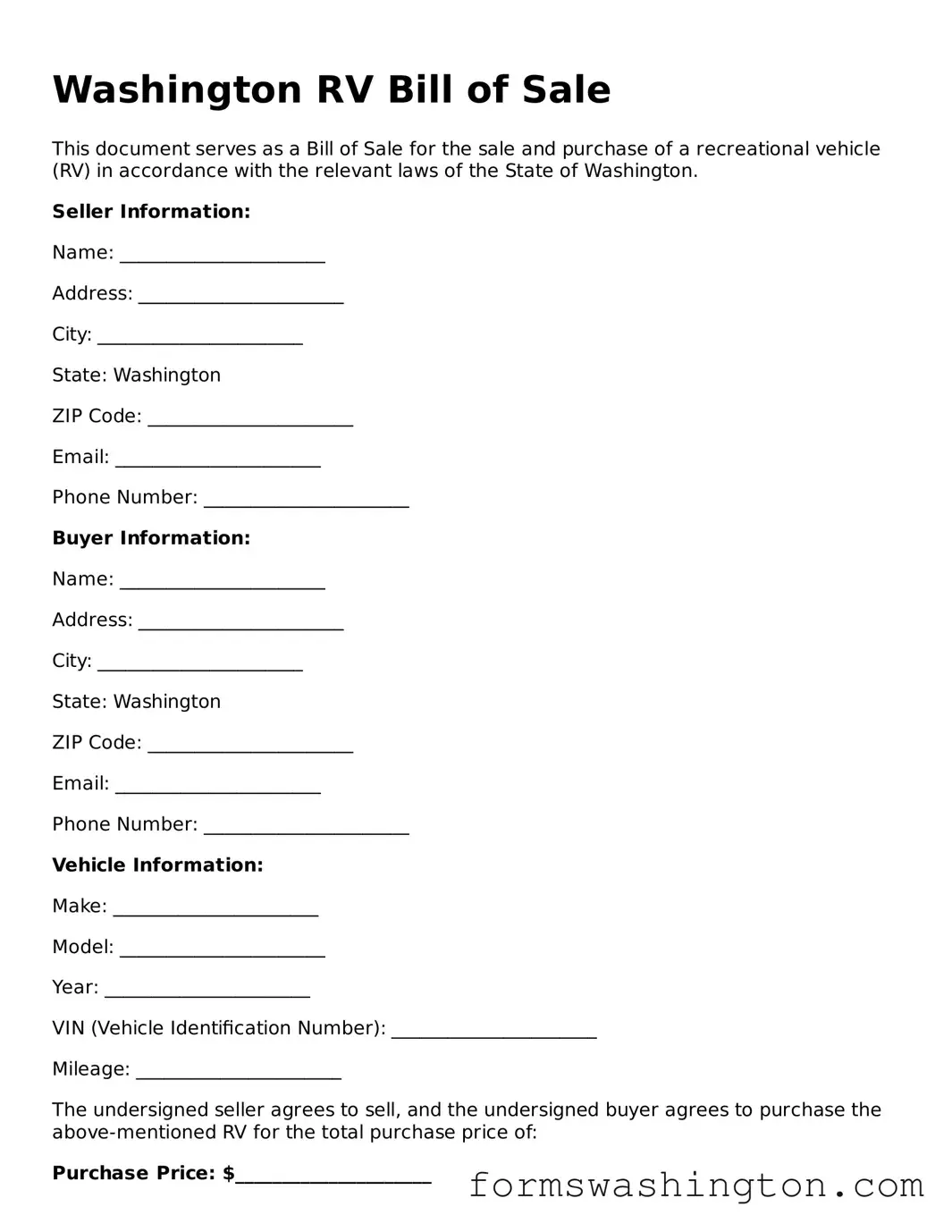Blank RV Bill of Sale Template for Washington State
The Washington RV Bill of Sale form is an essential document for anyone involved in the buying or selling of recreational vehicles in the state. This form serves multiple purposes, including providing proof of ownership, facilitating the transfer of title, and documenting the sale transaction for both the buyer and seller. It includes key details such as the names and addresses of both parties, the vehicle identification number (VIN), make, model, and year of the RV, as well as the sale price. Additionally, it may contain information about any liens on the vehicle, ensuring that the buyer is fully informed about the RV's status. Completing this form accurately is crucial, as it helps protect both parties' rights and ensures compliance with state regulations. Furthermore, having a properly executed Bill of Sale can simplify the registration process with the Department of Licensing, making it easier for the new owner to obtain their title and registration. Understanding the importance of this document can help streamline the transaction and avoid potential disputes down the line.
Documents used along the form
The Washington RV Bill of Sale is an essential document for the transfer of ownership of recreational vehicles in the state of Washington. However, several other forms and documents are often utilized in conjunction with this bill of sale to ensure a smooth and legal transaction. Below is a list of these documents, each serving a specific purpose in the process of buying or selling an RV.
- Title Transfer Document: This document officially transfers the title of the RV from the seller to the buyer. It includes vital information such as the vehicle identification number (VIN), the names of both parties, and the sale date. Completing this form is crucial for the buyer to establish legal ownership.
- Odometer Disclosure Statement: Required by federal law, this statement records the mileage on the RV at the time of sale. It helps prevent fraud by ensuring that the buyer is aware of the vehicle's usage history. Both parties must sign this document for it to be valid.
- Bill of Sale for Personal Property: This general bill of sale can be used for various personal property transactions, including RVs. It provides a written record of the sale and includes details such as the purchase price and any conditions of the sale. While not specific to RVs, it can serve as an additional layer of documentation.
- Sales Tax Form: In Washington, buyers may need to complete a sales tax form to report the purchase of the RV for tax purposes. This form helps ensure that the correct amount of sales tax is paid and is often required when registering the vehicle with the Department of Licensing.
Utilizing these documents alongside the Washington RV Bill of Sale can facilitate a more secure and legally compliant transfer of ownership. Each form plays a vital role in protecting the interests of both the buyer and the seller, ensuring that the transaction is clear and transparent.
Misconceptions
Understanding the Washington RV Bill of Sale form is essential for anyone involved in the buying or selling of recreational vehicles. However, several misconceptions can lead to confusion. Here are nine common misunderstandings:
- It is not legally required. Many believe that a bill of sale is optional. In Washington, it is crucial for documenting the transfer of ownership.
- Any format is acceptable. Some think that a handwritten note suffices. However, using the official form ensures all necessary details are included.
- It does not need to be notarized. While notarization is not always required, having the document notarized can provide additional legal protection.
- Only the seller needs to sign. Both the buyer and seller must sign the bill of sale for it to be valid.
- It is only for private sales. This form is also applicable for transactions involving dealers, ensuring a clear record of the sale.
- It covers all vehicle types. The RV Bill of Sale specifically pertains to recreational vehicles, not all types of motor vehicles.
- It is not necessary for trade-ins. Even when trading in an RV, a bill of sale is still needed to document the transaction.
- Once signed, it cannot be changed. If errors are found after signing, amendments can be made, but both parties must agree to the changes.
- It is only for the seller's protection. The bill of sale protects both parties by providing a record of the transaction and the condition of the RV at the time of sale.
Being aware of these misconceptions can help ensure a smoother transaction when buying or selling an RV in Washington.
Check out Some Other Templates for Washington
Washington State Lease Agreement - Having a written lease fosters transparency in rental agreements.
Washington State Living Will Forms Free - Can be created with the assistance of legal or healthcare professionals for accuracy.
Dos and Don'ts
When filling out the Washington RV Bill of Sale form, it's important to follow certain guidelines to ensure everything is completed correctly. Here’s a list of dos and don'ts to keep in mind:
- Do provide accurate information about the RV, including make, model, and VIN.
- Do include the purchase price and the date of sale.
- Do have both the buyer and seller sign the document.
- Do keep a copy of the completed form for your records.
- Don't leave any required fields blank; this could cause issues later.
- Don't use white-out or erasers on the form; corrections should be made clearly.
- Don't forget to check for any additional state requirements that may apply.
